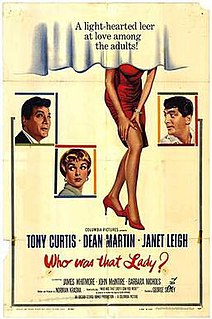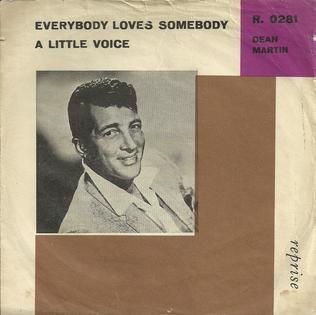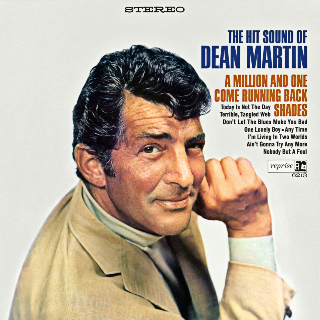Nicholas P. Tosches was an American journalist, novelist, biographer, and poet. His 1982 biography of Jerry Lee Lewis, Hellfire, was praised by Rolling Stone magazine as "the best rock and roll biography ever written."
"In the Cool, Cool, Cool of the Evening" is a popular song with music by Hoagy Carmichael and lyrics by Johnny Mercer. It was originally planned to feature it in a Paramount picture which was written for Betty Hutton that never took off. That projected film was to be called The Mack Sennett Girl. The song was buried in Paramount's files until it was rediscovered and then used in the 1951 film, Here Comes the Groom, and won the Academy Award for Best Original Song.
"I Don't Care If the Sun Don't Shine" is a popular song written by Mack David. It was originally written for the Disney animated feature Cinderella but was not used in the final print.

The Young Lions is a 1958 American World War II drama film directed by Edward Dmytryk and starring Marlon Brando, Montgomery Clift, and Dean Martin. It was made in black-and-white and CinemaScope by 20th Century Fox. The film is based upon the 1948 novel of the same name by Irwin Shaw.

The Wrecking Crew is a 1968 American spy comedy film directed by Phil Karlson and starring Dean Martin as Matt Helm, along with Elke Sommer, Sharon Tate, Nancy Kwan, Nigel Green, and Tina Louise. It is the fourth and final film in the Matt Helm series, and is loosely based on the 1960 novel of the same name by Donald Hamilton. The film opened in Canada in December 1968 before premiering in the United States in February 1969.

Who Was That Lady? is a 1960 comedy film directed by George Sidney and starring Tony Curtis, Dean Martin, and Janet Leigh.

"Everybody Loves Somebody" is a song written in 1947 by Sam Coslow, Irving Taylor and pianist Ken Lane.

"Rock-a-Bye Your Baby with a Dixie Melody" is a popular song written by Jean Schwartz, with lyrics by Sam M. Lewis and Joe Young. The song was introduced by Al Jolson in the Broadway musical Sinbad and published in 1918.

Black & White is a blended Scotch whisky. It was originally produced by the London-based James Buchanan & Co Ltd founded by James Buchanan. Originally known as House of Commons, its nickname, referring to the black and white labelling, was eventually adopted as the official brand instead. The brand's motif was conceived by James Buchanan himself during the 1890s.
"Hold Me" is a popular song by Jack Little, Dave Oppenheim, and Ira Schuster. The song was published in 1933; it was recorded by Little Jack Little, and covered by Eddy Duchin, Greta Keller and Ted Fio Rito.

The Dean Martin TV Show is a 1966 studio album by Dean Martin accompanied by the Les Brown orchestra, with arrangements by Ernie Freeman.

Happiness Is Dean Martin is a 1967 studio album by Dean Martin arranged by Ernie Freeman and Bill Justis.

The Dean Martin Christmas Album is a 1966 studio album by Dean Martin arranged by Ernie Freeman and Bill Justis.

The Hit Sound of Dean Martin is a 1966 studio album by Dean Martin arranged by Ernie Freeman and Billy Strange.

Dean Martin Sings Songs from "The Silencers" is a 1966 studio album by Dean Martin of songs that featured in his film The Silencers, the first of the four films featuring the Matt Helm character that Martin would appear in. A separate soundtrack of instrumental music from the film by Elmer Bernstein was also released. The album was arranged by Ernie Freeman and Gene Page.

Somewhere There's a Someone is a 1966 studio album by Dean Martin, produced by Jimmy Bowen.

Welcome to My World is a 1967 studio album by Dean Martin. The album was released after the unexpected success of the singles "In the Chapel in the Moonlight" and "Little Ole Wine Drinker Me". "In the Chapel in the Moonlight" had previously been released on Dean Martin Hits Again, and the title track, "Welcome to My World", had appeared previously on the 1965 album (Remember Me) I'm the One Who Loves You.

Dean Martin Hits Again is a 1965 studio album by Dean Martin, produced by Jimmy Bowen and arranged by Ernie Freeman. The album was a Top 20 hit, and Martin's fourth gold album.

The Nashville Sessions is a 1983 studio album by Dean Martin, produced by Jimmy Bowen. This was Martin's last album.
"I Never Had A Chance" is a popular song written by Irving Berlin, published in 1934. Popular versions that year were by Eddy Duchin and by Glen Gray & The Casa Loma Orchestra.















